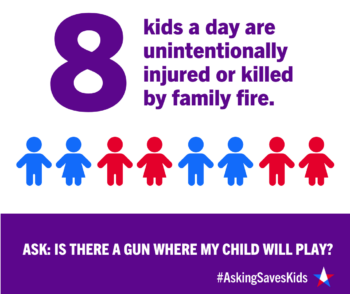 The first day of summer marks a season when kids often spend more time at the homes of friends and other family members.
The first day of summer marks a season when kids often spend more time at the homes of friends and other family members.
Before children head off for playdates or childcare in another home, parents often ask common safety questions about the house their child will be visiting like “Who else will be home?” “Are there pets in the house?” Or, “Can I install the car seat in your car before I leave?”
There’s one other important question parents should add to the list: “Is there an unlocked gun in your house?”
Gun violence, including homicide and suicide, is now the leading cause of death among children and teens in the United States, where 4.6 million kids live in homes with at least one loaded and unlocked firearm.
Every day, eight kids are unintentionally injured or killed as a result of “family fire,” which is a shooting involving an improperly stored or misused firearm found in the home.
“No one wants their child to be hurt when it is preventable,” said Dr. Mollie Grow, a pediatrician at Seattle Children’s Hospital. “As parents, the duty is on us to keep our children as safe as we can, and asking this question in a respectful way is one of the things we need to navigate.”
How to ask about guns
It can feel difficult to ask others how they handle gun storage, but know that research shows that 93% of parents, including parents who choose to own firearms, would be comfortable with being asked about a gun in their home.
As with all things, presenting your concerns with respect and without judgment goes a long way.
Here are some examples of how to ask:
- “Knowing how curious children can be, I hope you don’t mind me asking if you have a firearm in your home and if it is stored safely and securely…”
- “Mom, Dad, this is awkward for me and I mean no disrespect. I am concerned Susie will find one of the guns in your home when we visit. Do you keep them locked up with the ammunition stored separately?”
If the answer given leaves you with doubts about the safety of someone else’s home, invite the children to play at your home instead, meet at a park or play area, or make other arrangements for childcare.
In light of the country’s ongoing debate about firearms, some parents may be more nervous than ever to bring the topic up, but Grow said asking the question is vital.
“Unfortunately, we know that children and teens are shot daily in gun accidents,” said Grow. “Asking this question isn’t about debating gun rights. It’s a question about child safety.”
Safe firearm storage
One in three homes with children in the U.S. have guns, many unlocked or loaded.
Be sure that handguns, shotguns and rifles in your home, and the homes where your child spends time, are stored safely and securely.
These are the steps for triple safe storage, the safest way to store a firearm:
- Use a gun safe, lock box or trigger lock to store firearms. It is easy to quickly open safe storage devices when needed.
- Store firearms unloaded and locked.
- Store and lock ammunition in a separate place.
- If possible, avoid locking devices that only use keys because children and teens often know where keys are kept.
- Always lock guns up, even if your child or teen has had safety training.
Finally, if possible, remove firearms from your home if a family member is depressed, suicidal or is using drugs or alcohol. But remember, hiding a firearm is not safe storage.
“Toddlers explore, kids are curious, teens are sometimes drawn to firearms as a sign of power. Follow all of the safe storage steps to reduce the risk of unintentional injury or death,” said Grow.
Talk to your child or teen
In addition to asking adults about their firearm storage practices, teach your child or teen what to do if they come across a gun.
For young kids, explain that real guns can kill or seriously injure people, unlike toy guns or guns shown on TV, in movies or in video games.
Teach kids and teens that if they find a gun they should leave it alone, leave the room and tell an adult right away. This training doesn’t work for all kids, so safe storage is a must.
Hiding a gun is not enough and telling your child not to touch it is not enough.
Teach your child to tell an adult right away if they hear someone is going to bring a gun to school or elsewhere, or if they see a gun in someone’s personal belongings, like a backpack. Speaking up can save lives.
Spreading the word about safe gun storage
As a way to further the safe firearm storage conversation in communities, Grow and a team of doctors-in-training developed a toolkit to help community pediatricians learn effective ways to discuss safe firearm storage during well-child visits.
“We developed resources to support community pediatricians in inviting their patient families to ask them questions about safe firearm storage,” said Grow.
Parents can help others get more comfortable about asking. Consider sharing information on safe gun storage with your child’s preschool, childcare or local PTA.
Seattle Children’s and community partners hold safe firearm storage giveaway events around Washington state as a way to invite the community to learn about the importance of safe gun storage, especially for homes with children and teens.
Attendees receive hands-on training about how to use a lock box and trigger lock, then receive one free locking device.

